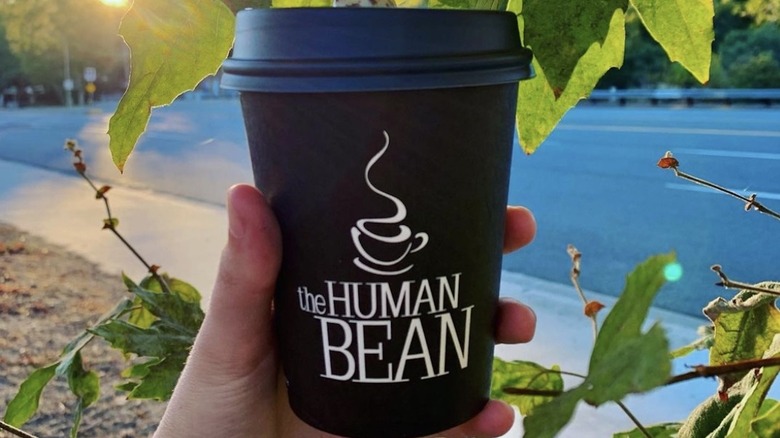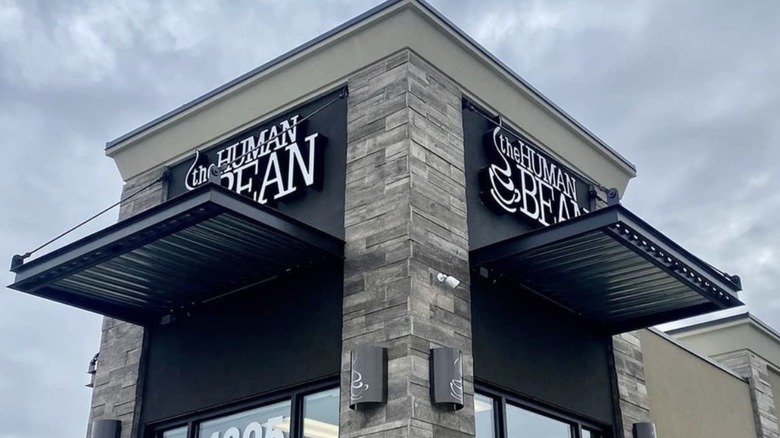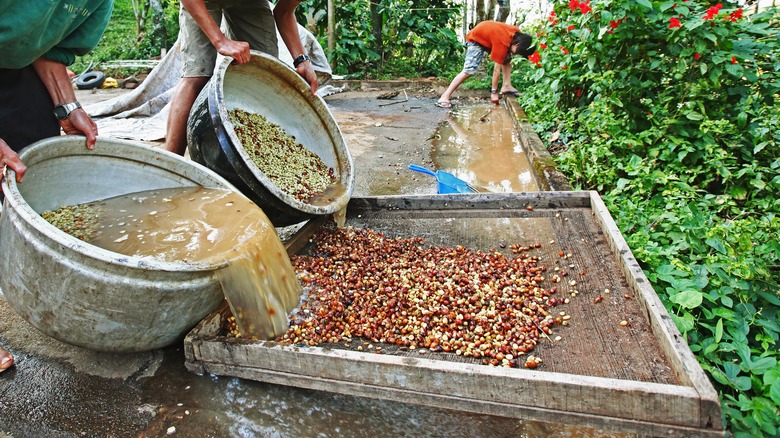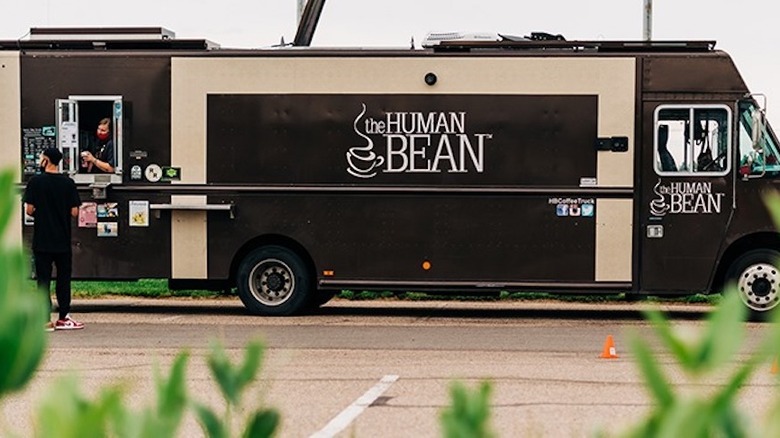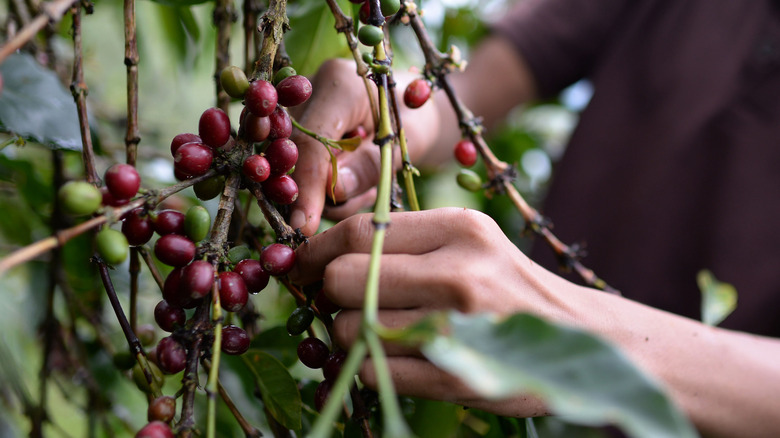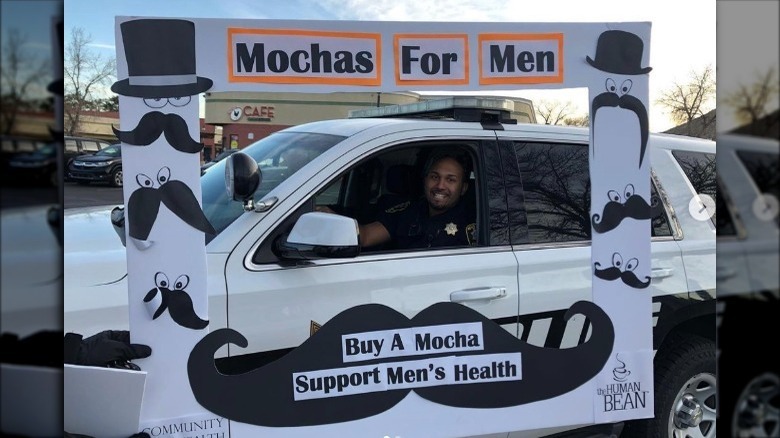The Untold Truth Of The Human Bean
Perhaps it's because of the rainy climate or the go-go energy of the prominent tech culture, but for whatever reason, the Pacific Northwest loves its coffee. That is, seriously loves coffee in all its myriad forms, whether it's a classic but still strong drip, espresso-based Italian-inspired beverages, or caffeinated cold drinks. The region has produced quite a few of America's biggest coffee concerns, including such notables as Starbucks, Seattle's Best Coffee, Dutch Bros, Black Rock Coffee Bar, and, of course, the unforgettably named shop known as The Human Bean. An early adopter of the drive-through format, The Human Bean started as a small, coffee-shilling kiosk in the resort town of Ashland, Oregon in 1998 (via The Human Bean). It has since grown into a formidable franchise of 300 outlets and counting.
With a recognizable rectangular building that's easy to drive up to and away from during your morning commute or mid-road trip coffee stop, The Human Bean has popped up in small tracts of land across 25 different states. Despite the drive-thru setup, it sells some pretty premium coffee drinks in its signature black cups, all made from carefully selected beans that are generally organic, too. And The Human Bean has really distinguished itself with a signature move — a free chocolate-covered espresso bean that comes perched atop every drink sold. It's a nice little bonus and a distinct calling card for the caffeine franchise.
Here's everything there is to know about the origins and operations of this quirky coffee company.
The origin of The Human Bean
The Human Being is a relatively new company, all things considered. Consider that, by the time it opened its doors and drive-thru lane, Starbucks had already been operating for over 20 years, according to Britannica. As for The Human Bean, according to the International Franchise Association, married couple Dan and Rhonda Hawkins came up with the idea for the spot and asked one of Dan's old high school friends, Tom Casey, and his spouse, Tami, to get the company off the ground.
After opening its first drive-through coffee stand in Southern Oregon in 1998 and then beginning its local expansion, the coffee purveyor started offering franchising opportunities just four years later. And less than two decades after that, The Human Bean was regularly recognized by Entrepreneur in its "Franchise 500" list. It ranked in a relatively lofty spot at number 97 in 2021 among all American companies that utilize that distinct franchise business model.
The Human Bean sprung up just a few miles from the headquarters of (and on the same customer territory) as another drive-up coffee chain based in Oregon, Dutch Bros, according to the Mail Tribune Ashland Edition. But the market for coffee in the region was so strong that it could actually support another cluster of automobile-accessible, fully functional coffee kiosks. We're telling you, people in the Pacific Northwest of the United States are really, really serious about getting their caffeine fix.
The Human Bean has a unique way of decaffeinating coffee
Coffee isn't merely an effective, relatively inexpensive, readily available caffeine delivery system. Rather, it's a robust and interesting beverage with a rich culture and history and that some people enjoy solely for the taste. Sure, if you've had the sad variety that comes in certain gas stations or car dealerships, you may disagree. But there is some truly extraordinary coffee out there.
Only, there are people who still love the taste and texture of the drink but simply can't manage to take in the jitter-inducing and potentially heart-jolting caffeine in massive quantities. Thus exists decaffeinated coffee. For some, it's everything great about coffee, but without the powerful shock to the central nervous system that a fully caffeinated brew might deliver. In keeping with its commitment to clean, natural products, The Human Bean utilizes a chemical-free decaffeination process it actually helped to popularize in the United States. Said process is known as the Swiss Water Process (via The Human Bean).
Rather than solvents and lab-created compounds, The Human Bean uses the principles of solubility and the process of osmosis to take the kick out of organic coffee beans. After the beans are cleaned and hydrated, they're combined with Green Coffee Extract, which pulls out the caffeine. Both the GCE and the caffeine are then carbon-filtered out of the beans. The whole process is repeated several times until 99.8 percent of stimulants are completely removed, all over the course of 10 hours.
The Human Bean operates a futuristic coffee truck
Drive-thru coffee bars are a modern, novel way for caffeine seekers to get what they need without even leaving their cars. It's a business model The Human Bean helped popularize. In Colorado, the company is at the forefront of the next step in offering convenient coffee out of a small parcel of space. In 2015, according to Daily Coffee News, The Human Bean launched The Human Bean Coffee Truck. While the concept of coffee-on-wheels has been around for decades, the vehicle itself is truly something special — and all for the noble purpose of dispensing coffee.
Designed and built with the help of Custom Cart Solution of Fort Collins, Colorado, the sleek van uses solar panels to power three espresso machines, a granita maker, a smoothie machine, and "The Juice Bar," a charging station for customers' smartphones. The front seat converts into a small office, the restroom features a zero-gravity waste-flow system. The truck even has a flatscreen monitor to stream events like Colorado State University football games, because the first Human Bean Coffee Truck was stationed outside the CSU stadium during football season.
But this mobile coffee unit doesn't have to be mobile. In fact, it's proven to be a real-life transformer, though without all of the drama of the popular cartoon and film series. To transform into a kiosk, three rear towers on the vehicle lower down and release wheel coverings, making the truck almost indistinguishable from a brick-and-mortar outpost.
The Human Bean gives back to coffee-producing regions
To be a player in the crowded, competitive coffee business, a chain has to offer some pretty seriously high-quality products. Now, ideally, that claim will come from coffee beans with a lot of flavor, or which are produced under some special circumstances. Perhaps they're grown organically and sustainably, which is proving to be a growing concern amongst consumers who may think more carefully about the origin of their cup of java.
The Human Bean's supply of cultivated and harvested coffee beans comes from an in-house program called Farm Friendly Direct. According to Entrepreneur, The Human Bean pays coffee growers slightly more than what market prices typically dictate. The company then funnels the overages into community improvement projects in the areas where those very beans are grown. Said projects can include infrastructure ventures like digging clean wells, developing solar energy resources and collection, and building schools.
To date, The Human Bean has funded projects in more than 12 countries in Africa, Central America, South America, and Asia. The coffee chain started giving back to producers in 1999, only a year after it opened its first kiosk and three years before it started its franchising venture. In Colombia, the company initiated a three-year project beginning in 2018 to build and improve 55 septic and sanitary units. It's also invested in planting shade trees in El Salvador, building accessible wells in Tanzania, and raising money for orphanages in India and Indonesia (via The Human Bean).
The Human Bean donates quite a lot of money to help fight cancer
Many businesses have a few favored causes to which they donate profits and encourage their own customers to get involved in the spirit of giving back. The Human Bean just happens to be one of those community-minded companies. One of its signature promotions is an annual charity drive focused on men's health. Since 2014, every November at The Human Bean is "Mochas for Men" month. Various franchise locations offer two special mochas throughout the month, namely "The Gent" (a chocolate mocha with sweet praline and caramel flavors) and "The Lumberjack" (which features a distinct and hearty chocolate and peanut butter profile). A dollar from each "Mochas for Men" beverage sold in November — which also, not coincidentally, happens to be "Movember," a time to raise awareness of prostate and testicular cancer — goes to men's health organizations.
Of course, men's health isn't the only focus for The Human Bean's charity drives. Each October brings Coffee for a Cure Day at The Human Bean, which brings attention to women's health and especially breast cancer. Participating locations donate 100 percent of their proceeds to local organizations to help pay for mammograms, breast cancer education programs, and patient support for low-income women. Over the years, the company has raised more than $1.5 million via Coffee for a Cure Day.
